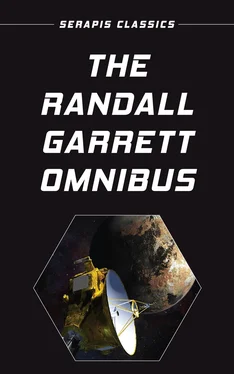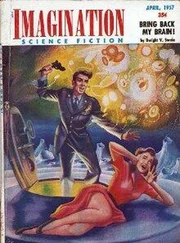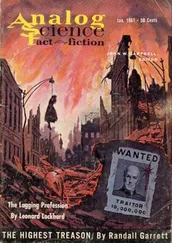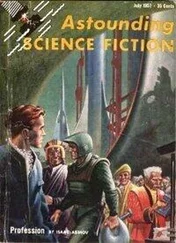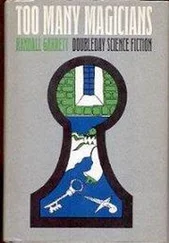Hawaii, with its beauty and its perfect climate, had been the obvious choice for the center of the Terran Empire. For centuries before the coming of interstellar travel, the islands had been used to a mixture of tongues and races, and the coming of the Empire had merely added to that mixture. In the five centuries since Man had begun his explosive spread to the stars, more "races" had come into being due to the genetic variations and divisions that occurred as small groups of isolated colonists were cut off from Earth and from each other. The fact that interstellar vessels incorporating the contraspace drive were relatively inexpensive to build, plus the fact that nearly every G-type sun had an Earth-like planet in Bode's Third Position, had made scattering to the stars almost an automatic reflex among men.
It had also shattered the cohesion of Mankind that had been laboriously built up over several millennia. The old U.N. government had gradually welded together the various nations of Earth under one flag, and for nearly two centuries it had run Earth like a smoothly operating machine. But no culture is immortal; even the U.N. must fall, and fall it did.
And, during the chaos that followed, a man named Jerris Danfors had grabbed the loosened reins of government just as Napoleon had done after the French Revolution. Unlike Napoleon, however, Jerris had been able to hold his power without abusing it; he was able to declare himself Emperor of Earth and make it stick. The people wanted a single central government, and they were willing to go back to the old idea of Empire just to get such a government.
Jerris the First was neither a power-mad dictator nor an altruist, although he had been called both. He was, purely and simply, a strong, wise, intelligent man—which made him abnormal, no matter how you look at it. Or supernormal, if you will.
Like Napoleon, he realized that wars of conquest were capable of being used as a kind of cement to hold the people together in support of their Emperor. But, again, unlike Napoleon, he found there was no need to sap the strength of Earth to fight those wars. The population and productive capacity of Earth was greater than any possible coalition among extra-Solar planets and vastly greater than any single planet alone.
Thus the Terran Empire had come into being with only a fraction of the internal disruption which normally follows empire-building.
But Man can flee as well as fight. Every invading army is preceded by hordes of refugees. Ships left every planet threatened by the Empire, seeking new, uncharted planets to settle—planets that would be safe from the Imperial Fleet because they were hidden among a thousand thousand stars. Mankind spread through the galaxy faster than the Empire could. Not even Jerris the First could completely consolidate the vast reaches of the galaxy into a single unit; one lifetime is simply not enough.
Nor are a dozen.
Slowly, the Empire had changed. Over the next several generations, the Emperors had yielded more and more of the absolute power that had been left to them by Jerris. While history never exactly repeats itself, a parallel could be drawn between the history of the Empire and the history of England between, say, 1550 and 1950. But, while England's empire had begun to recede with the coming of democratic government, the Terran Empire continued to spread—more slowly than at first, but steadily.
Until, that is, the Empire had touched the edges of the Gehan Federation.
For the hordes that had fled from the Empire had not forgotten her; they knew that one day the Empire would find them, that one day they would have to fight for their independence. So they formed the Federation, with its capital on the third planet of Gehan's Sun.
It was a federation in name only. Even after several generations, the refugees had not been able to build up enough population to fight the Empire. There was only one other way out, as they saw it. They formed a military dictatorship.
In the Twentieth Century, the German Third Reich, although outnumbered by its neighbors and enemies, populationwise, had concentrated all its efforts on building an unbeatable war machine. Japan, also outnumbered, had done likewise. Between them, they thought they could beat the rest of Earth. And they came dangerously close to succeeding.
The Gehan Federation had done the same thing, building up fleets and armies and material stockpiles as though she were already at war.
And, in doing so, her citizens had voluntarily forfeited the very thing they thought they were fighting for—their freedom.
But they posed a greater threat to the Terran Empire than that Empire had ever faced before. Any nation so totally prepared for defensive war may, at any moment, decide that the best defense is a good offense. Any nation which subjects its people to semislavery for the sake of war must eventually fight that war or suffer collapse.
The Empire had to change tactics. Instead of steady expansion, she was forced into a deadly game of interstellar chess, making her plays carefully, so as not to touch off the explosive temper of her opponent.
It was not a situation to be handled by clumsy fools.
And Lord Senesin, the Prime Portfolio of the Imperial File, the elected leader of the Empire, the constitutional head of the Imperial Government, was accused, not only of being a clumsy fool, but of being a dangerous madman. The planet Bairnvell was an independent, autonomic ally of the Gehan Federation, and, although not actually a member of the Federation, was presumably under her protection. For the Imperial Fleet to go to the aid of rebels trying to overthrow Bairnvell's lawful government seemed to be the act of an insane mind. The people of the Empire wouldn't stand for it.
Colonel Lord Barrick Sorban was well aware of the temper of the people and of the situation that prevailed politically in the Empire—more so, in fact, than most men. He was also well aware that internal strife of a very serious nature could so dangerously weaken the Empire that the Gehan Federation would be able to attack and win.
His job was to cut off that sort of thing before it could gain momentum. His job was to maintain the Empire; his only superior was the Emperor himself; his subordinates hand-picked, well-trained, and, like himself, unobtrusive to the public eye. And not one of those subordinates knew who the colonel's superior was.
The colonel strolled along the streets of Honolulu with all the courteous aplomb of a man who was both an officer and a gentleman of leisure. He dropped in at various respectable clubs and did various respectable things. He went into other places and did other things not so respectable. He gave certain orders to certain people and made certain odd arrangements. When everything had been set up to his satisfaction, he ate a leisurely dinner, topped it off with two glasses of Velaskan wine, read the tenth edition of the Globe , and strolled out to the street again, looking every inch the impeccable gentleman.
At ten minutes of eleven, he took a skycab to the fashionable apartment house where the Honorable Jon Senesin, son of the Prime Portfolio, made his home. The skycab deposited him on the roof at two minutes of eleven. The android doorman opened the entrance for him, and he took the drop chute down to the fifteenth floor. At precisely eleven o'clock, he was facing the announcer plate on Jon Senesin's door.
Senesin opened the door. There was a queer look—half jubilant, half worried—on his face as he said: "Come in, my lord, come in. Care for a drink?"
"Don't mind if I do, Jon. Brandy, if you have it."
Young Senesin poured the brandy, speaking rapidly as he did. "I've made an appointment to get those tapes, my lord. I want you to go with me. If we can get them, we can break this whole fraud wide open. Wide open." He handed the colonel a crystal goblet half filled with the clear, red-brown liquid. "Sorry I left so hurriedly this morning, but if that Heywood character had said another word I'd have broken his nose for him."
Читать дальше
